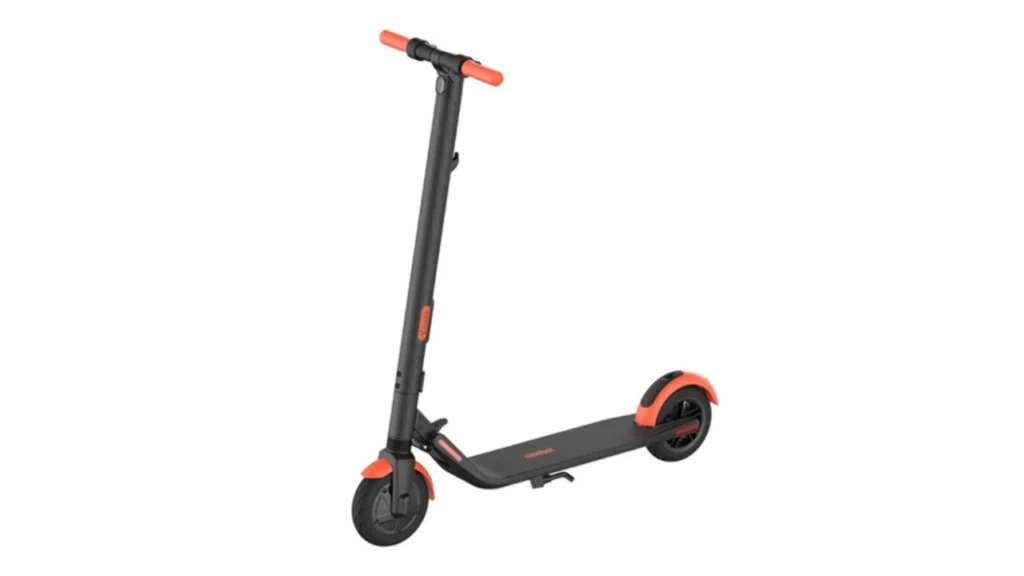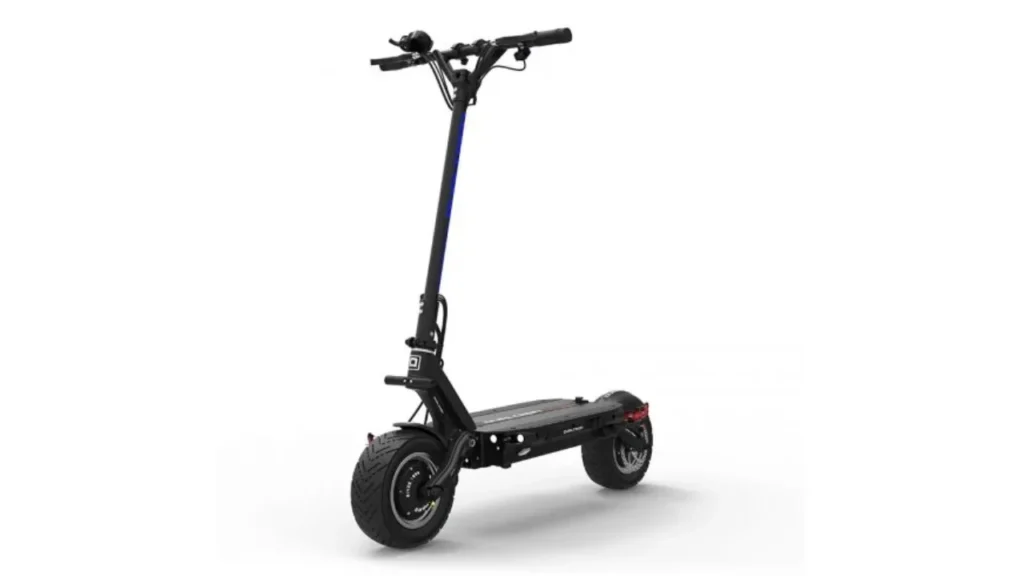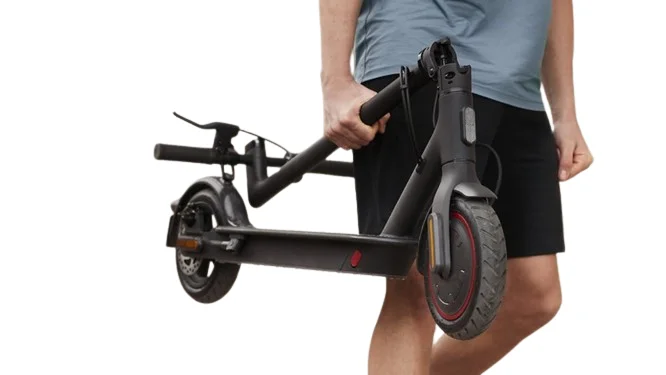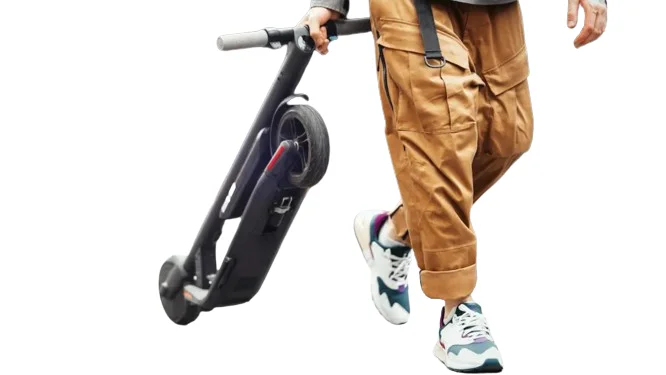Electric scooters are becoming more popular as a convenient and eco-friendly way of transportation. But how much does an electric scooter weigh, and why does it matter?
In this blog post, we will answer these questions and provide some tips on choosing the right electric scooter for your needs.
The weight of an electric scooter depends on many factors, such as the frame, battery, motor, and tires. The average weight of an electric scooter for adults is between 20 and 30 pounds (9 and 14 kg).
However, there is a wide range of electric scooters available, from the lightest ones at around 15 pounds (7 kg) to the heaviest ones at over 100 pounds (45 kg).
The weight of an electric scooter affects its usability, portability, energy efficiency, stability, and durability.
A lighter scooter is easier to carry around, especially if you need to climb stairs or take public transportation. A heavier scooter may have more features, such as a larger battery, a more powerful motor, or a sturdier frame.
The weight of an electric scooter also influences its speed, range, and braking performance. Therefore, you should consider your personal preferences, budget, and riding environment when choosing an electric scooter.
- Also Read: How to Start an E-Scooter
- Also Read: Start E-Scooter Rental Business
- Also Read: Charging Time of E-Scooter
- Also Read: Reset E-Scooter
Three Categories of Electric Scooters
Following are the three categories of electric scooters in the market:
- Kick scooters are the most lightweight. They weigh around 16 pounds on average and can go up to 15 mph.
- Commuter scooters are intermediate, with an average weight of 24 pounds and a maximum speed of 20 mph.
- Heavy-duty scooters are the heaviest, with an average weight of about 66 pounds and a top speed of 25 mph.
Kick Scooters

If you are looking for a fun and easy way to zip around the neighborhood, kick scooters are the way to go. They are the lightest type of electric scooters, weighing less than 20 lbs.
Kick scooters are ideal for kids or short-distance commuters who don’t need much speed or power. They are simple to use and store. You can fold them up and fit them in your car trunk or under your desk.
They are also affordable and eco-friendly. However, kick scooters have some limitations. They are not very durable or comfortable for long rides. They can only reach up to 15 mph, which is not fast enough for some riders.
Commuter Scooters

If you want a balance between performance and portability, commuter scooters are the best choice. They are the most popular type of electric scooters, weighing between 20 to 45 lbs.
Commuter scooters are suitable for work commutes and leisure rides within a few miles of home. They have a decent range and speed. They can travel up to 15 miles on a single charge and reach up to 20 mph. They are also easy to maneuver and handle.
Commuter scooters have some features that make them more comfortable and safe, such as suspension, brakes, and lights. However, commuter scooters are not very cheap or powerful. They may struggle on steep hills or rough terrain.
Heavy-Duty Scooters

If you want a beast of a machine that can take you anywhere, heavy-duty scooters are the way to go. They are the heaviest and most powerful type of electric scooters, weighing over 50 lbs.
Heavy-duty scooters are designed for long-distance travelers and thrill-seekers who want to explore new places at high speed. They have an impressive range and speed. They can travel over 60 miles on a single charge and reach up to 25 mph.
Heavy-duty scooters are also very sturdy and smooth. They have some features that make them more luxurious and reliable, such as large tires, seats, and batteries.
However, heavy-duty scooters are not very cheap or portable. They are expensive and bulky. They may be hard to carry or store.
Benefits of Lightweight Electric Scooters

Lightweight electric scooters are often disliked by many people, but they have many advantages if you choose a light one that weighs between 15 and 30 pounds. Here are some of them:
Suitable for Kids
Light electric scooters are more kid-friendly than heavier ones. Your kids will enjoy riding a light scooter more than a bulky one. Even a young child can handle a 15-pound e-scooter easily.
However, you should follow the minimum age requirements for electric scooters in your state. They are there to keep you and your kids safe, which is what the critics of e-scooters care about.
Easy to Repair
If you need to fix your e-scooter, it helps to have some mechanical skills and knowledge of small engines. But if you don’t, you can always take your scooter to a qualified mechanic or a certified service center.
Easy to Carry and Store
Another advantage of light electric scooters is that they are easy to carry and store. Most modern scooters can fold and have a handle for convenience.
You can easily take your light scooter to your office or put it in your car trunk. You can also store your light and foldable scooter anywhere in your house when you are not using it.
Durable
Light e-scooters can be very durable, especially if they are made of carbon fiber. Carbon fiber is a material that is both light and strong.
You should check the quality of the components before you buy a light scooter. Be aware that carbon fiber e-scooters can cost more than other scooters.
Good for Hills
The weight of the e-scooter and the power of the motor are important for hill climbing. A 24-volt motor may not be enough for steep hills, but it can work well if the scooter is light.
You should look for e-scooters that have a good balance between weight and power if you want to climb hills easily. Another thing that helps with hill climbing is suspension, which makes your ride more stable and smooth on uneven surfaces.
Pros and Cons of Heavy-Duty Electric Scooters
Do you love off-road adventures and long-distance rides? Do you need a scooter that can handle any terrain and support heavy riders? If yes, then you might want to consider a powerful electric scooter.
A powerful electric scooter is also known as a heavy-duty electric scooter. It has a lot of benefits, but also some drawbacks. Let’s take a look at them.
Pros of Heavy-Duty Electric Scooters
Amazing Range
A heavy-duty electric scooter can go as far as 32 miles or more on a single charge. That’s because it has a large battery with a high capacity and a long lifespan.
Excellent Performance
A heavy-duty electric scooter can climb steep hills, navigate dirt roads, and cruise on footpaths with ease. It has a strong motor, a smooth suspension system, and puncture-resistant tires that can handle any bumps and obstacles.
Suitable for Heavy Riders
A heavy-duty electric scooter can accommodate riders who weigh more than the average scooter user. It has a sturdy frame, a wide deck, and a high weight limit.
Cons of Heavy-Duty Electric Scooters
Heavy Weight
A heavy-duty electric scooter is not easy to carry around. It weighs a lot because of its big motor and battery. It is not portable or foldable, and it takes up a lot of space. You can’t store it under your desk or in a small elevator.
Long Charging Time
A heavy-duty electric scooter takes a long time to recharge. It has a big battery that needs more hours to fill up. It can take anywhere from 6 to 12 hours to charge fully, compared to 4 to 6 hours for a regular electric scooter.
Factors That Affect the Weight of Electric Scooter
If you are looking for an electric scooter, you might be wondering why some of them are heavier than others. The answer lies in the components that make an electric scooter heavy.
Following are the main factors that contribute to the weight of an electric scooter:
The Frame
The frame is the backbone of any scooter. It supports the rider and the other parts of the scooter. A heavy duty scooter needs a strong and durable frame to withstand the stress and impact of riding on rough terrain or carrying heavy loads.
Therefore, the frame of a heavy-duty scooter is usually made of thick and sturdy materials, such as steel or aluminum. This makes the frame bigger and heavier than a regular scooter.
The Motor
The motor is the heart of an electric scooter. It converts the electrical energy from the battery into mechanical energy to spin the wheels. A heavy-duty scooter needs a high-performance motor to achieve fast acceleration and high top speed.
The motor size, shape, and power output vary depending on the type and design of the scooter. Generally, a larger and more powerful motor will be heavier than a smaller and less powerful one.
The Battery
The battery is the power source of an electric scooter. It provides the electricity to run the motor and the lights. A heavy-duty scooter needs a powerful battery to deliver enough speed and range for long-distance trips or steep hills.
Most heavy duty e-scooters use lithium-ion batteries, which are more efficient and reliable than other types of batteries. However, lithium-ion batteries are also heavy and bulky, especially for larger capacities. A typical battery for a heavy-duty scooter can weigh up to 40 lbs or more.
The Suspension System
The suspension system is the shock absorber of an electric scooter. It reduces the impact and vibration from the road and improves the ride quality and comfort. A heavy-duty scooter often comes with a sophisticated suspension system that can adjust to different terrains and conditions.
The suspension system can be either spring or hydraulic. Spring suspension uses metal coils or springs to absorb the shock. Hydraulic suspension uses fluid or air to cushion the impact.
Both types of suspension are complex and heavy, adding to the overall weight of the scooter.
The Tires
The tires are the feet of an electric scooter. They provide traction and stability on the road. A heavy-duty scooter needs big and durable tires to handle the weight and pressure of the scooter and the rider.
The tires can be either solid or pneumatic. Solid tires are made of rubber or foam and do not require air. They are puncture-proof and low-maintenance, but they are also stiff and hard.
Pneumatic tires are filled with air and have a tube inside. They are more comfortable and smooth, but they are also prone to flats and leaks. Both types of tires are heavy, especially for larger sizes.
Why Does Electric Scooter Weight Matter?
Weight is an important factor to consider when buying or riding an electric scooter. It affects not only the size of your scooter, but also how it handles and how safe it is.
Here are some of the reasons why you should care about the weight of your electric scooter:
Safety
This is the number one priority. You need to feel comfortable and in control of your scooter, and that depends on its weight. But don’t assume that heavier scooters are for heavier riders, and lighter scooters are for lighter riders.
The weight of your scooter should suit your riding preference and ability, not your weight.
Portability
At some point, you will have to lift or carry your scooter, whether it’s to put it away, take it with you, or repair it. If your scooter is too heavy for you, you will struggle to manage it.
Think about what would happen if your scooter stopped working in the middle of nowhere, or if it landed on you during an accident. Could you lift it or get it off you?
Storage space
In general, the heavier the scooter, the larger the scooter. And if you have limited space, you might not have enough room to store your scooter.
You don’t want your scooter to occupy all the space in your wardrobe, or worse, in your living room.
Speed
Heavier scooters tend to have more speed and power. This can be a good thing or a bad thing, depending on how you like to ride. If you are not confident riding a fast electric scooter, you might find it intimidating or dangerous.
On the other hand, if you are a skilled rider, you might love the adrenaline and excitement of a fast e-scooter.
Lightweight E-Scooter vs. Heavyweight E-Scooter
It depends on what you are looking for in an electric scooter.
If you want an awesome electric scooter that can go faster than 30 mph, and a battery that lasts for hours of off-road fun, then a heavy scooter is for you.
Heavy scooters are also great for commuting, especially if you are a big guy who needs a sturdy and powerful ride that can handle your weight.
But if you want a sleek scooter, a smooth ride that can take you to and from work without hassle, a heavy duty scooter might not be the best fit. This is where you need to do some research for the best lightweight electric scooters.
Importance of Weight When Buying an Electric Scooter
The weight of your e-scooter matters depending on how you use it. If you don’t need to lift it often, you can ignore the weight and focus on other features.
But if you want a scooter that is easy to carry around, store in small spaces, and transport on public vehicles, then you should look for the lightest option available.
The trade-off is between power and portability. A heavier scooter will have more speed, range, and hill-climbing ability. A lighter scooter will be more convenient for short trips and urban mobility.
You should choose the best electric scooter that suits your needs and preferences.
Conclusion
Before buying an eclectic scooter, you may want to know how much it weighs and how it affects its performance and portability. The average weight of an electric scooter is around 27 pounds or 12.2 kg, but it can vary from 10 to 95 pounds depending on the model and features.
The weight of an electric scooter depends on several factors, such as the battery, motor, frame, wheels, and suspension. Generally, lighter scooters are easier to carry and store, but they may have lower speed, range, and stability.
Heavier scooters are more powerful and durable, but they may be harder to transport and require more energy to run. The best electric scooter for you depends on your weight and lifestyle, so you should think about what you need and want before buying one.

